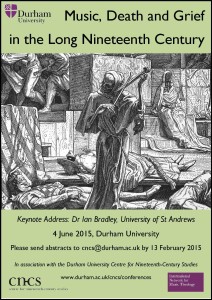 CFP
CFP
Centre for Nineteenth-Century Studies and International Network for Music Theology
Durham University
June 4, 2015
Deadline: February 13, 2015
“Music, Death and Grief in the Long Nineteenth Century”
“O may I join the choir invisible Of those immortal dead who live again In minds made better by their presence”
-George Eliot
Keynote Address: Dr Ian Bradley, University of St Andrews
Responses to death in the nineteenth century were often musical. Whether it was the massed choir singing for the funeral of the Duke of Wellington in 1852, or a pious evangelical woman reciting the text of a favourite hymn on her bed as she died a ‘good death’, music was employed to comfort the dying and the bereaved. The elegiac lieder of Schumann and the cathartic singing at death rituals in rural Greece offer two disparate examples of how the ‘work of mourning’ could be achieved through musical composition and performance. Death could also be represented and understood in musical terms, such as after the outbreak of cholera during a Paris carnival in 1832 which inspired the portrayal of Death playing the fiddle in Alfred Rethel’s ‘Death as a Cutthroat’.
This one-day interdisciplinary conference seeks to explore the role of music in response to death and grief in any part of the world between 1780 and 1918. It is a subject that may be addressed from many perspectives, from history to psychology and from literature to philosophy. Musicological and historical studies are welcomed, as well as papers exploring the theology of death, the psychology of grief, and literary and artistic representations of music, death and grief during this period. Conference organizers invite abstracts of 300 words for 20-minute individual papers or 30-minute lecture-recitals, and 500 words for panels (three papers). Topics might include, but are not limited to:
- Music at funerals and burials
- Representing death and grief in art music and literature
- Theological approaches to music and death
- Music and death in the nineteenth-century mission field
- Psychology of grief; the grieving composer/poet/writer
- Global perspectives of music and death from this era
For more details please contact Joanna Heath (joanna.heath2@durham.ac.uk), or visit: www.durham.ac.uk/cncs/conferences/mdgconference
Please send abstracts to cncs@durham.ac.uk by February 13, 2015